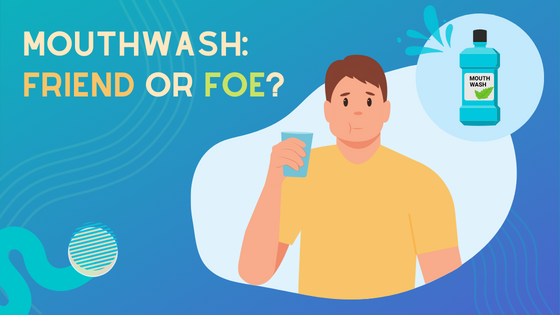Every dentist will tell you that it is necessary to brush and floss your teeth to maintain your oral health, but what about using mouthwash? Is it an essential part of your dental routine, a neutral addition, or actively harmful? While there isn’t a dental consensus about the necessity of mouthwash, there are certain facts that can help you decide whether it is right for you.
Ingredients Matter
Mouthwashes are not one-size-fits-all, and the ingredients and effects vary. However, according to the ADA, there are two distinct varieties: cosmetic and therapeutic.
Cosmetic mouthwashes are solely used to provide a fresh, clean feeling and to temporarily minimize bad breath for several hours. If you are only looking to use a mouthwash to improve your oral health, these types of mouthwashes are unnecessary.
Therapeutic mouthwashes, on the other hand, have more varied ingredients and can provide a number of benefits including the reduction of bad breath, gum disease, and tooth decay. They can also whiten teeth and decrease pain.
Here are the most common mouthwash active ingredients to remember and the function of each:
- Fluoride: strengthens enamel, cavity prevention
- Chlorhexidine: treats and prevents gingivitis, prevents the buildup of plaque, and lowers the chance of getting dry socket after a tooth extraction (can cause staining)
- Peroxide: whitens surface of teeth, kills germs
- Xylitol: dry mouth relief
- Lidocaine: local anesthetic that provides temporary pain relief
- Cetylpyridinium chloride: kills bacteria that can cause bad breath
Many of the active ingredients in therapeutic mouthwashes are available over-the-counter at your local drugstore, but those that contain chlorhexidine or lidocaine will require a prescription.

Can Mouthwash Have Side Effects?
Unfortunately, mouthwash use has the potential for unwanted side effects. Formulations containing alcohol can cause dry mouth or canker sores. Chlorhexidine rinses can stain teeth, especially when used for longer than recommended. Additionally, bacteria-killing ingredients can wipe out the natural oral microbiome that helps to maintain healthy gums and teeth, since they can’t tell the difference between good and bad bacteria. If you must use a bacteria-killing mouthwash, use sparingly or at the instruction of your dentist.
Here are a few additional facts to keep in mind if you are considering adding mouthwash to your dental health routine:
- Mouthwash cannot replace your regular brushing and flossing routine.
- Kids under the age of six should not use mouthwash due to the risk of swallowing.
- Look for rinses that have a higher pH value (more alkaline). If a mouthwash is too acidic, it can erode enamel or cause other unwanted effects.
- If you have dry mouth, avoid using a rinse that contains alcohol.
At the end of the day, while most over-the-counter mouth rinses have beneficial properties, they can only do so much. Mouthwashes are useful for treating minor oral health issues and provide extra help to people who are prone to dental problems. It is a good idea to consult with your dentist for personalized advice and recommendations that will have the most benefit to your oral health.
